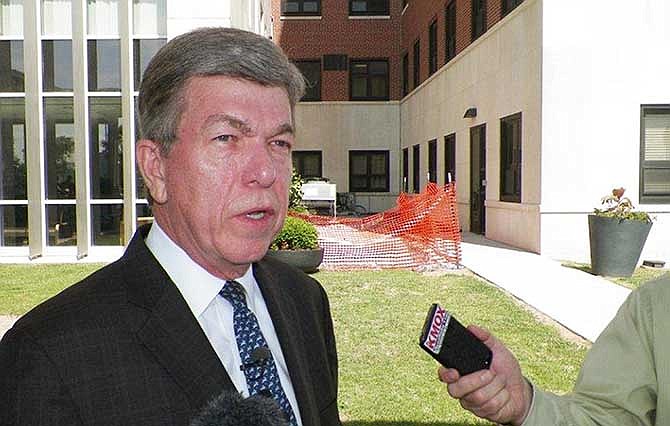American veterans deserve major improvements in their health care system.
And U.S. Sen. Roy Blunt told reporters Thursday the current complaints about some Veterans Administration's hospitals "leads us to, really, opportunity to discuss veterans' care in new ways."
On Wednesday afternoon, Blunt announced that the Kansas City Veterans Medical Center admitted to his staff that the facility did have an "unauthorized" waiting list that compromised care for area veterans.
"These so-called "unauthorized wait lists' for America's heroes are simply unacceptable and will not be tolerated," Blunt said in a news release. "I'm going to do everything I can to ensure this stops immediately.
"Our veterans should not be forced to wait for care."
That announcement came about three hours after a conference call where the Missouri Republican told reporters he's been hearing from some veterans' organizations "about the increasing desire among veterans to have alternatives" to the VA health care system.
Blunt is in his fourth year in the U.S. Senate, after serving 14 years in the U.S. House.
Among his duties are membership on the Senate's defense appropriations and authorizing committees.
While in Missouri last week, Blunt toured several veterans facilities, and asked VA administrators to detail how many veterans at Missouri facilities had been forced to wait more than 90 days to see a doctor.
The answer included 19 at the Truman VA Hospital, Columbia; 26 in St. Louis' two veterans hospitals; 14 in Poplar Bluff and a dozen in Kansas City.
"All these hospitals could be doing better, and competition for veterans care would be a good thing," Blunt said. "The focus of veterans health care should be on what's good for veterans, not what's good for the Veterans Administration."
"Particularly younger veterans want more choices," Blunt said. "They want the ability to have care closer to home, or in locations where they're more comfortable going to talk with someone about their mental and physical health problems."
He noted the VA "has made a big deal about streamlining their process, about getting wait times down to 14 days."
Adding some elements of competition could prompt the VA health system to meet their 14-day goal more quickly, Blunt said.
But, as he said last week while touring the hospitals and meeting with veterans group leaders, Blunt added: "For some health care conditions, there should be no waiting period," including things like a heart attack or a suicidal veteran.
Even if the system begins offering alternatives, Blunt said, "There are things that, clearly, the veterans care system and the veterans hospitals and clinics should be better at than anyone else - things like the results from IED attacks, the kinds of injuries that occur from those attacks (such as) eyesight, loss of limbs, rehabilitation from those attacks.
"Post-traumatic stress would be another area where, in all likelihood, the veterans health care delivery system should have more experience and be better at than anybody else."
Some have suggested the current VA problems would have been avoided if Congress had provided the agency more money.
But Blunt doesn't buy that.
"This is not about money. It's probably not even about who the secretary (of Veterans Affairs) is," Blunt said. "It's about trying to deal with this in a way that puts veterans first.
"The Veterans Administration, for the last five years, has had more money than they could spend.
"The last thing the government needs to do at this moment, is think we're going to solve this problem by throwing a bunch of money at the problem. This is a problem where we need to look at the system and figure out how to change the system - so it works better for veterans."

